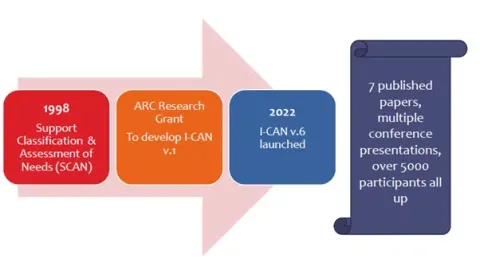
The NDIS chose the I-CAN assessment tool for its so-called independent assessments of NDIS participants.
A4 is alarmed by the NDIA's choice of assessment tool. If the PEDI-CAT ASD does not work sufficiently well for young autistic children (see Autism CRC assessment here and here) then I-CAN with a very small number of questions has zero chance of working effectively for autistic NDIS participants.
While I-CAN was designed for use by treating clinical professional, but the NDIS will rely mostly on assessors without professional registration (and its associated ethics) or knowledge of the participants they assess and the impairment types they are reporting on. The disability sector simply cannot trust the assessors.
A4 also rejects the process the NDIS used to select its assessment tool.
- Government did not even consult disability representative organisation (DROs) or the NDIS's DRCO consultative process in making its decision. DROs, like A4, cannot be confident that this is a good decision.
- Information about I-CAN is extremely limited and simply unavailable to the public
- At this stage, we see no indication the I-CAN tool was designed for or validated with autistic subjects - a cohort who will form a substantial part of NDIS participants who are subjected to the assessment tool.
As yet, there is no evidence available to the autism sector showing that there has even been an attempt to validate I-CAN for use with autistic people.
A4 has requested references for the 7 publications mention on the I-CAN website - but has not received a response.
A4 wrote to the Minister - see below. As mentioned in the letter, there are a lot of questions that need answers.
Actions like this, the absence of consultation on such a critical issue, destroy the trust of the disability sector in government:
A4 recognises that the cost of the NDIS is a serious problem/challenge for government, especially increasing diagnosis rates for autism spectrum disorder. However, refusing to talk about better assessment with disability representatives and others in the sector simply will not work. Government should have learned a lesson from its experiences with Closing the Gap where it started out refusing to engage with the people affected. Clearly, it has not learnt; it thinks it can fix disability support without even talking to people with disability, especially long-standing representatives of the autism sector such as A4.
Government keeps doing the same thing and expecting different outcomes. We must judge those involved accordingly.
| Attachment | Size |
|---|---|
| 20250925_McAllister.pdf (123.92 KB) | 123.92 KB |